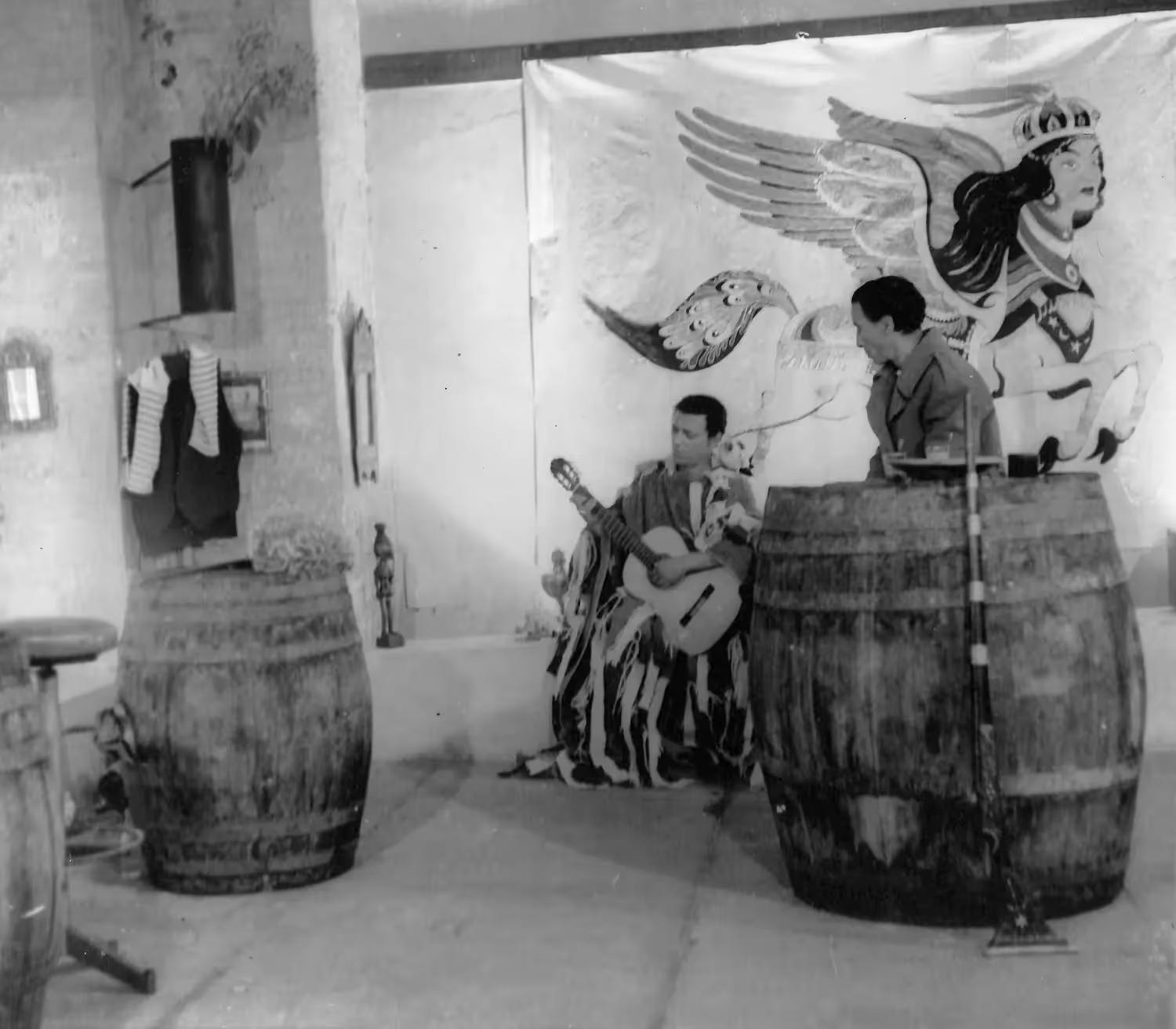





Screening of the films "Les quatre sources" and "Le Mirage", a tribute to Ahmed Bouanani, the storyteller.
For this evening's tribute to Ahmed Bouanani, a major artistic figure and fervent defender of transmission and memory against oblivion, we'll be screening his two fiction films: "Les quatre sources", his short film in color, a dreamlike poetic essay, followed by the masterpiece and only feature film Le Mirage. Both explore the realms of folk tale and myth.

All dates



Screening of the films "Les quatre sources" and "Le Mirage", a tribute to Ahmed Bouanani, the storyteller.
For this evening's tribute to Ahmed Bouanani, a major artistic figure and fervent defender of transmission and memory against oblivion, we'll be screening his two fiction films: Les quatres sources, his short film in color, a dreamlike poetic essay, followed by the masterpiece and only feature film Le Mirage. Both explore the space of folk tale and myth.
The four springs (1978 / 37')
With Kabir Benbich, Naïma Saoudi, Noufissa Doukkali, Latifa Souibli. Ahmed Bouanani's only color film is a dreamlike poetic essay in dialectal Arabic (zajal poetic speech, a form usually declaimed in popular assemblies). It follows the trajectory of a young man whose village is burnt down and whose mother is killed. He remembers his father's words on his deathbed, advising him to go and find a wise man in the mountains, and sets off in search of him.
The Mirage (Assarab)
(1980 / 100')
With Mohamed el-Habachi, Mohamed Saïd Afifi, Abdellah Amrani, Fatima Regragui, Mohamed Rzine begins with a silent scene.
A man stands alone in a field, violently throwing stones at an invisible enemy. He seems to be fighting furiously against a mysterious force. His stones can do nothing. Can injustice, poverty and oppression be reduced by throwing stones? The year is 1947. The Kingdom of Morocco has been under French protectorate since 1912. In a small village, local authorities are distributing sacks of flour to the needy. That's when Mohamed Ben Mohamed enters the scene. Floating in a worn, dusty and patched military-style jacket, the man looks lost. He listens in awe as the civilian inspector calls him lazy.
Ahmed Bouanani
Ahmed Bouanani (1938-2011) was a filmmaker - director, screenwriter and editor - writer and cartoonist. He was a major figure in Moroccan intellectual and artistic life. He defended the practice of art without regard to hierarchies between genres. Neither major nor minor art, but the unambiguous reign of people's know-how. In this all-encompassing vision of the artist's craft, all Ahmed Bouanani's disciplines feed off one another, driven by a holistic project: reinventing collective practices and forms (editing, soundtrack, dreaming) and, in so doing, acting as a transmitter of heritage and memory.
An unrivalled editor in the cinema, Bouanani is also unrivalled in his literature, where he has "elevated the aesthetics of montage to an ethic of resistance in the face of dispossession" (Omar Berrada). His works deal with the writer's responsibility in the face of the disintegration of collective memory, in an age that promises only amnesia and the death of dreams. The author populates his worlds with real or imaginary characters (writer, journalist, angels and ogres), inviting the reader, not without humor, to move between referents.
For Bouanani, in the face of amnesia, the issue is not to preserve memory, but to reconstitute it beyond its pitfalls; to recreate new meaning from scattered fragments. We find again the central themes of his literature: the disappearance of reality, the derealization of the world, the role of the writer caught between the powerlessness of subjective memory and the porosity of collective memory.
Practical information
Address
Port de Tanger - Face à Bab El Marsa, Tanger, Maroc
Accessibility

Dates and times
Thursday, September 26, 9:00 pm to 11:00 pm

Safety

ADDITIONAL INFORMATION
EXPERIENCES On board


Immersive exhibition "Présentes
Created with the exceptional collaboration of the Musée du Louvre, this exhibition highlights female figures in Mediterranean civilization, thanks to the digitization and modeling of part of the Louvre's collections. A two-stage experience: an introductory film to provide context, followed by an immersive experience in a 16-meter-long tunnel covered by 120 m2 of LED screens.
A sound journey through the Mediterranean
An immersive sound experience designed by Ircam, inviting the public to explore the richness and diversity of the Mediterranean through headphones equipped with spatialized sound.
.webp)
© Elisa Von Brockdorff
The artists
Frequently asked questions
Yes, the boat is freely accessible on site. However, you can pre-book your time online on our website.
For reasons of safety and preservation of the boat, high heels and stilettos may not be worn on the boat.
The museum boat is open to all free of charge. To find out on which quay it will be moored, or to pre-book your slot, consult the page dedicated to your town.
Appropriate facilities have been set up on the Festival site for the reception and access of people with reduced mobility. The boat is equipped with a 1m-wide ramp, accessible to people with reduced mobility, but may require the accompaniment of a third party due to its gradient of over 6%. Access to the aft deck and immersive exhibition is possible. However, the upper deck is not accessible. Please inform us in advance of any special accessibility requirements, so that we can make the necessary arrangements.

.webp)

